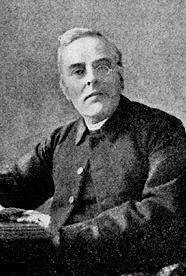John Ellerton
The Rev. John Ellerton (16 December 1826 – 15 June 1893) was a hymnodist and hymnologist.
John Ellerton | |
|---|---|
 John Ellerton | |
| Background information | |
| Born | 16 December 1826 Clerkenwell, Middlesex, England |
| Died | 15 June 1893 (aged 66) |
| Occupation(s) | Chaplain, hymodist, hymnologist |
Life
He was born in Clerkenwell, Middlesex, England, to George Ellerton, the head of an evangelical family. He was educated at King William's College on the Isle of Man, and Trinity College, Cambridge, (B.A. 1849; M.A. 1854),[1] where he came under the influence of Frederick D. Maurice. He died in Torquay, Devon, England, aged 66.
Service
Taking orders in 1850, he was Curate of Easebourne, Sussex. In 1852, he was in Brighton, and Lecturer of St. Peter's, Brighton.
In 1860, he became chaplain for Lord Crewe and vicar of Crewe Green in Cheshire, about thirty miles southeast of Liverpool. He became chairman of the education committee at the Mechanics Institute for the local Railway Company. Reorganizing the Institute, he made it one of the most successful in England. He taught classes in English and Bible History. He also organized one of the first Choral Associations of the Midlands.
In 1872 he became Rector of Hinstock, Shropshire. In 1876, he was transferred to Barnes, (then in Surrey), a western suburb of London. The work among a large population broke him down and he had to go abroad for a year, serving as Chaplain at Pegli in Italy from 1884-1885. After returning, he took a smaller parish in White Roding in 1886, his last.[2] During his final illness, he was given the honorary title of Canon of St. Albans Cathedral.
Published works
Ellerton was best known as a hymnologist, editor, hymn-writer and translator. He published Hymns for Schools and Bible Classes in Brighton in 1859. He was co-editor with William Walsham How and others of the Society for Promoting Christian Knowledge (SPCK) Church Hymns, 1871. His Notes and Illustrations of Church Hymns were published in the folio edition of 1881.
Ellerton wrote or translated eighty-six or more hymns:
- The Day Thou Gavest, Lord, is Ended
- Saviour, again to thy dear name we raise[3]
- This is the day of light
- Behold us, Lord, a little space
- God the Almighty one! King who ordainest (stanzas 1&2 by Henry F. Chorley, 3-5 by Ellerton)
- Now the labourer's task is o'er.
- Week-day Worship
- Throned upon the Awe-full Tree[4]
- Welcome Happy Morning![5]
References
- "Ellerton, John (ELRN845J)". A Cambridge Alumni Database. University of Cambridge.
- Ellerton, John; Houseman, Henry; John Ellerton: Being a Collection of His Writings on Hymnology, Together with a Sketch of His Life and Works, Society for Promoting Christian Knowledge, 1896 p.157
- Saviour, again to thy dear name we raise (text), sung to the tune "Ellers" (mp3; four verses; organ only)
- Throned upon the Awe-full Tree (text), sung to the tune "Gethsemane" (mp3; four verses; organ only)
- Welcome Happy Morning! (text, abridged), sung to the tune "Sei du mir gegrüsset" (mp3; four verses; organ only)
External links
Notes
- Julian, John (June 1907). A Dictionary of Hymnology. London: John Murray. pp. 826–828.
- Bailey, Albert Edward (1950). The Gospel in Hymns. New York: Charles Scribner's sons. pp. 424–430.
- "King William's College Register". Retrieved 2007-01-17.